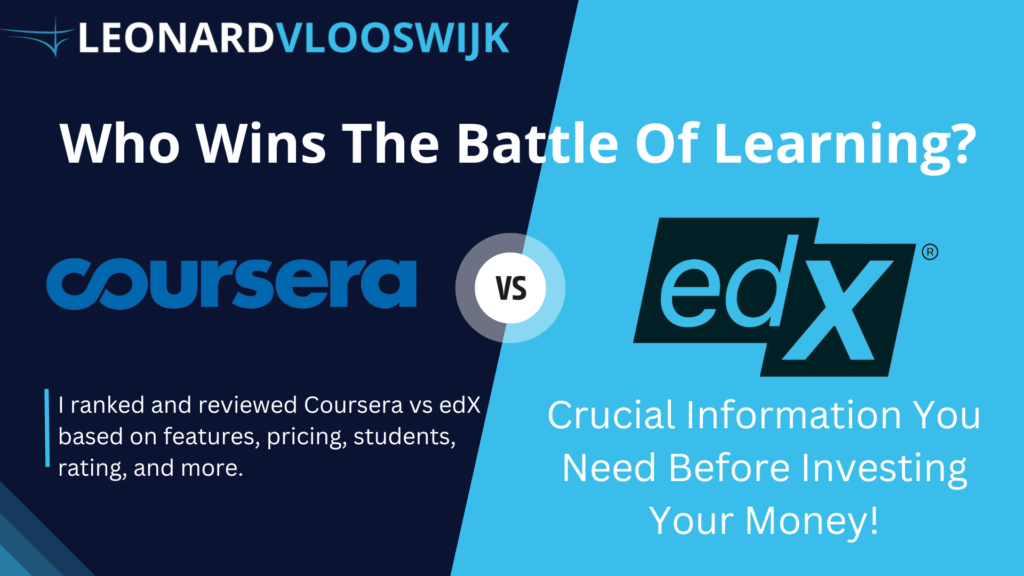In the ever-evolving landscape of online education, choosing the right platform can be a crucial decision on your journey to acquiring new skills, advancing your career, or simply exploring your passions.
Coursera and edX stand tall as two of the most prominent players in this field, each offering a treasure trove of courses, certifications, and opportunities for personal growth.
But, who wins the battle of Coursera vs edX?
In this comprehensive guide, we embark on a journey through these platforms, comparing and contrasting their features, courses, pros, and cons.
Whether you’re a lifelong learner or a professional looking to upskill, join us as we unravel the world of Coursera vs edX to help you make an informed choice and find the ideal platform to fuel your educational aspirations.
This article is full and in-depth but if you are in a rush, the headlines are:
Coursera
Coursera is a leading online learning platform known for its structured, high-quality courses and top-tier university collaborations. Offering a diverse range of subjects and valuable certifications, it’s a go-to choice for career advancement and personal growth. Coursera Plus simplifies access to a wealth of courses, making lifelong learning more accessible than ever. Whether you’re on a career path or a lifelong learning journey, Coursera has something to offer.
edX
edX is an open-source online learning platform known for its accessibility and specialization options. With a wide array of courses, MicroMasters programs, and professional certificates, it caters to diverse learning needs. Whether you seek career advancement or simply want to explore new subjects, edX offers flexible, self-paced learning, innovative tools, and a supportive learning community. It’s a gateway to specialized knowledge and skills, empowering learners worldwide.
Let’s get right into my Coursera vs edX comparison!
Coursera and edX in a Nutshell
In the world of online education, Coursera and edX stand out as two of the most renowned platforms. They offer a plethora of courses, each with its unique features and advantages.
Let’s delve into the basics of Coursera and edX to help you understand what makes these platforms special and allow us to answer the Coursera vs edX battle.
About Coursera
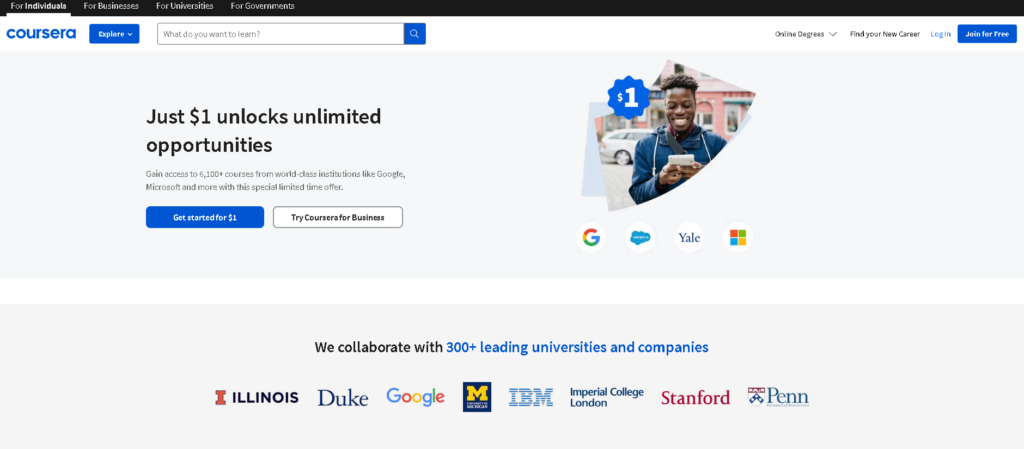
Coursera, founded in 2012 by Stanford University professors, is a leading name in online education. Its mission is to provide universal access to world-class education. Coursera partners with top universities and organizations globally to offer a wide range of courses.
One of Coursera’s standout features is its focus on courses leading to certifications, specializations, and even fully accredited online degrees. It covers diverse fields, from business and technology to arts and humanities.
Coursera’s courses are structured, providing a clear learning path with modules and assignments. Many courses are self-paced, allowing flexible learning.
Coursera offers a free audit option for most courses, granting access to course materials. However, certificates and graded assignments typically require payment.
About edX

edX, launched in 2012 by Harvard University and MIT, is another influential player in online education. As a nonprofit organization, its mission is to increase global access to high-quality education. edX partners with renowned universities, colleges, and institutions worldwide.
A notable feature of edX is its commitment to open-source learning. Many courses are available for free, providing quality educational content without cost. Verified certificates upon completion usually come with a fee.
edX offers a wide spectrum of subjects, including science, engineering, arts, and business. It provides self-paced courses and MOOCs (Massive Open Online Courses) with set start and end dates, emphasizing flexibility and affordability.
Coursera vs edX Courses
When looking at Coursera vs edX, the courses offered by Coursera and edX are among the most popular and respected in the industry. Whether you’re seeking to acquire new skills, earn certifications, or complete a degree, these platforms offer a wide array of options.
In this section, we’ll explore how to find the best courses on Coursera and edX and highlight some top picks.
My Top Tips for Finding the Best Courses
Before we dive into the specifics of Coursera and edX courses, here are some general tips to help you find the best courses on these platforms:
- Define Your Goals: Determine your learning objectives and career aspirations. Knowing what you want to achieve will guide your course selection.
- Read Reviews and Ratings: Take advantage of user reviews and ratings. Learner feedback can provide valuable insights into course quality and relevance.
- Consider Prerequisites: Check if a course has prerequisites. Ensure you have the required background knowledge to succeed.
- Explore Specializations: Both Coursera and edX offer course series called “Specializations” or “MicroMasters.” These can be a great way to gain in-depth knowledge in a specific area.
- Audit for Free: Many courses allow you to audit them for free. This lets you access course materials without paying, helping you decide if the course is right for you.
- Check for Financial Aid: Coursera and edX offer financial aid for eligible learners. If cost is a concern, explore these options.
About Coursera Courses

Coursera‘s course catalog is vast and diverse. It’s known for offering courses from some of the world’s top universities and institutions. Here’s what you can expect from Coursera courses:
- Structured Learning: Coursera courses are often structured with a clear learning path. They consist of video lectures, quizzes, assignments, and peer-reviewed assessments.
- Flexible Options: Many courses are self-paced, allowing you to study at your convenience. However, some have fixed start and end dates.
- Certifications: Coursera offers certificates for completed courses. Some courses also lead to specializations and fully accredited online degrees.
Best Coursera Courses
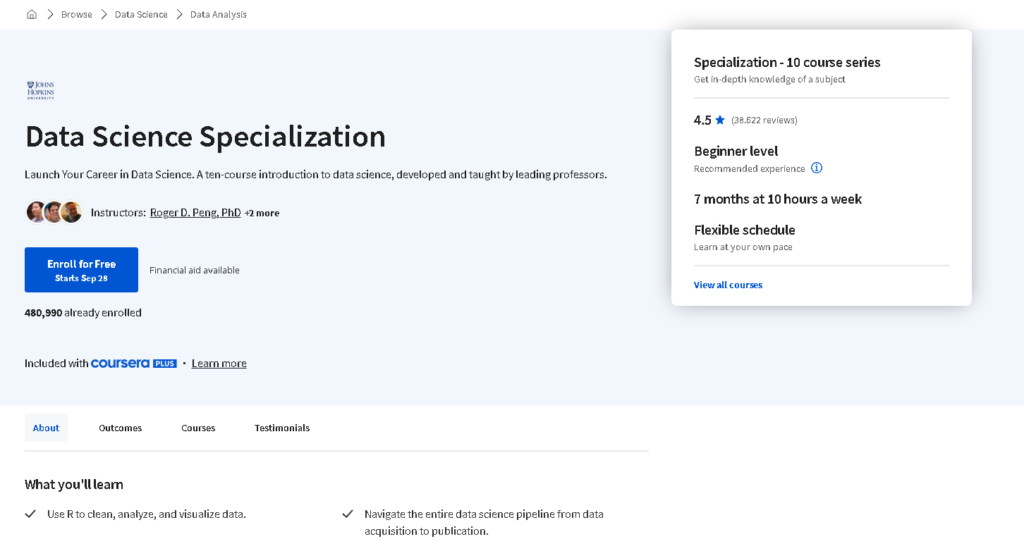
These are my personal picked top 7 Coursera Courses out there on the platform:
- Machine Learning by Stanford University: An introduction to artificial intelligence and machine learning.
- Google IT Support Professional Certificate by Google: A program that prepares you for IT support roles.
- Learning How to Learn by UC San Diego: A course focused on mastering efficient learning techniques.
- The Science of Well-Being by Yale University: Explore the science behind happiness and well-being.
- Python for Everybody by the University of Michigan: A course for beginners to start programming with Python.
- Financial Markets by Yale University: Understand the forces that shape financial markets.
- Data Science Specialization by Johns Hopkins University: A series of courses covering data science concepts, analysis, and visualization.
About edX Courses
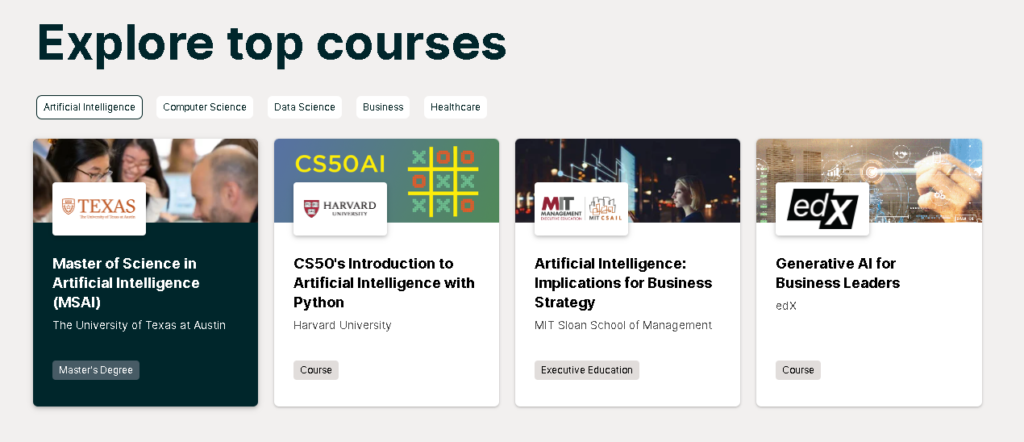
edX, like Coursera, partners with prestigious universities and institutions to offer a wide range of courses. Here’s what you can expect from edX courses:
- Open-Source Learning: Many edX courses are available for free, including access to course materials. However, verified certificates often require a fee.
- Flexibility: edX courses can be self-paced, allowing you to learn at your own speed. Some follow a more structured schedule.
- MicroMasters and Professional Certificates: edX offers MicroMasters programs and professional certificates that can enhance your resume.
Best edX Courses
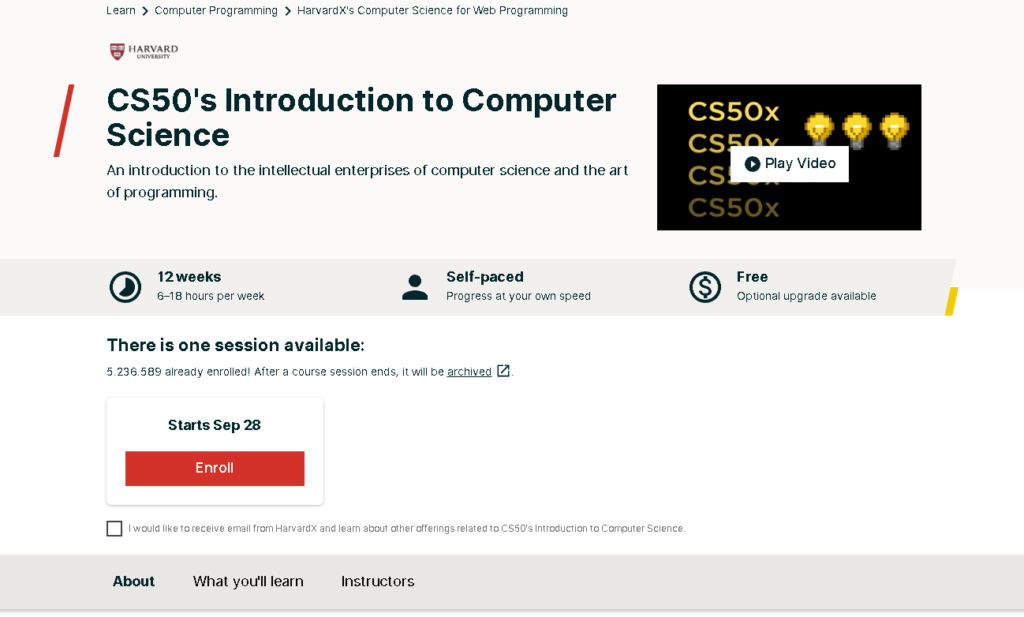
Here are 7 of the highest rating courses on edX:
- Introduction to Computer Science by Harvard University: A fundamental course in computer science concepts and programming.
- IBM Data Science by IBM: A comprehensive program covering data analysis, machine learning, and data visualization.
- Artificial Intelligence: Implications for Business Strategy MIT Sloan School of Management: A program that explores various aspects of artificial intelligence.
- Introduction to Linux by LinuxFoundationX: Learn the basics of the Linux operating system.
- CISL: Communicating for Influence and Impact by University of Cambridge: Improve your English language skills for STEM fields.
- Blockchain Fundamentals by BerkeleyX: Understand the core concepts and technologies behind blockchain.
- Analyzing and Visualizing Data with Power BI by Davidson College: Learn to use Power BI for data analysis and visualization.
These courses cover a range of subjects and are highly regarded for their quality and content.
Coursera vs edX Teachers and Course Quality
When comparing Coursera vs edX, the quality of instructors and the courses they offer plays a pivotal role in the overall educational experience.
Let’s compare Coursera vs edX in terms of the teachers they feature and the quality of their courses.
Coursera Teachers and Course Quality
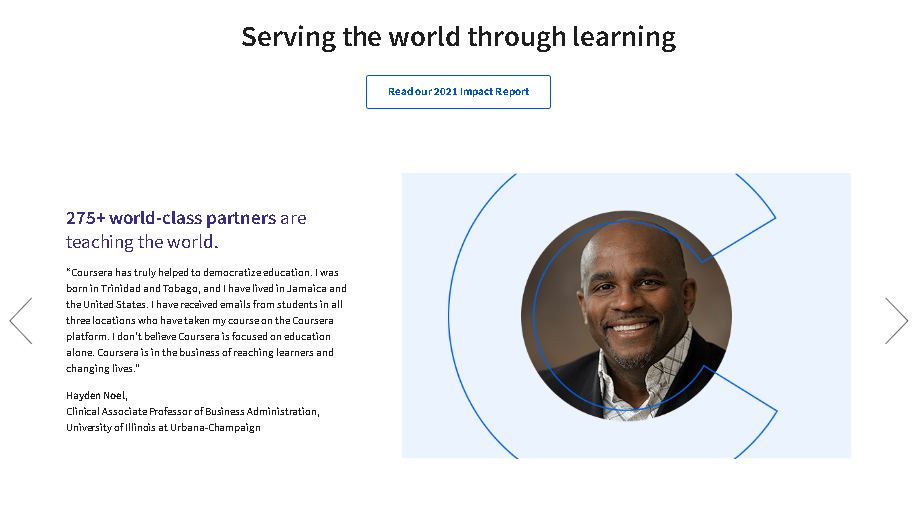
Coursera boasts an impressive lineup of instructors from some of the world’s top universities and institutions. These educators are experts in their respective fields and are known for delivering high-quality content. Here’s what you can expect from Coursera:
- Diverse Faculty: Coursera collaborates with renowned universities, including Stanford, Yale, and the University of Michigan. This means you get access to a wide range of instructors with varied expertise.
- Structured Courses: Coursera courses are typically well-structured, with a clear learning path that includes video lectures, assignments, and quizzes. This organization ensures a comprehensive learning experience.
- Peer Assessment: Some Coursera courses incorporate peer assessment, allowing students to evaluate each other’s work. This adds depth to the learning process.
- Student Reviews: You can often find student reviews and ratings for Coursera courses. These can provide insights into the quality and effectiveness of a course and its instructor.
edX Teachers and Course Quality
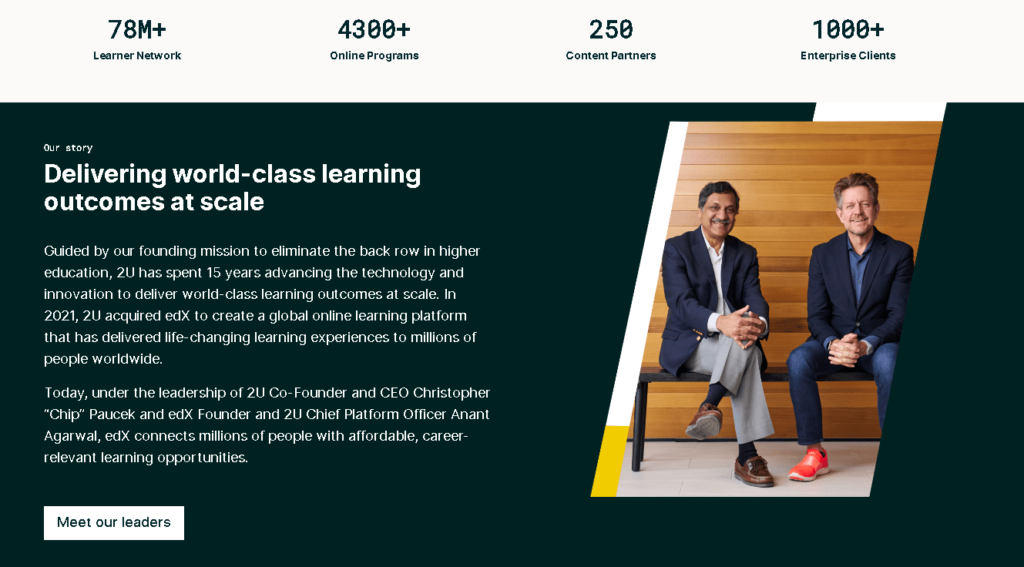
edX also collaborates with prestigious universities and institutions to provide a wide selection of courses. Here’s what you can expect in terms of edX’s teachers and course quality:
- Diverse Faculty: Similar to Coursera, edX partners with renowned institutions like Harvard, MIT, and UC Berkeley. This ensures access to a diverse pool of instructors.
- Flexible Learning Paths: edX courses offer a mix of self-paced and time-bound learning options. This flexibility allows you to choose the learning style that suits you best.
- MicroMasters and Professional Certificates: edX offers programs like MicroMasters and professional certificates, which often include multiple courses. These programs provide in-depth knowledge in specific areas and are designed to enhance career prospects.
- Innovative Learning: edX is known for its innovative approach to teaching. Some courses incorporate interactive elements, virtual labs, and real-world projects.
- Community Engagement: edX fosters a sense of community through discussion forums and peer interaction, enhancing the overall learning experience.
Coursera vs edX Features
Coursera and edX, two giants in the online education landscape, offer a range of features that cater to diverse learning needs.
Let’s compare the key features of Coursera vs edX to help you make an informed choice.
Coursera Features
- Structured courses with clear learning paths.
- Specializations and fully accredited online degrees.
- A wide selection of courses covering diverse domains.
- Flexibility with self-paced and scheduled courses.
- Awarding of certificates upon course completion.
edX Features
- Access to many courses for free with course materials.
- MicroMasters programs and professional certificates.
- Flexible learning options, including self-paced courses.
- Integration of innovative learning tools like virtual labs.
- Community engagement through discussion forums.
- Partnership with prestigious institutions for quality instruction.
Coursera vs edX Pricing and Refund Policy
When considering online learning platforms like Coursera vs edX, it’s essential to understand their pricing structures and refund policies.
These factors can significantly impact your decision. Let’s compare the pricing and refund policies of Coursera and edX.
Coursera Pricing
Coursera offers various pricing options:
- Free Courses: Coursera allows you to audit many courses for free, granting access to course materials. However, this often excludes graded assignments and certificates.
- Single Course Purchases: If you want a certificate and graded assignments, you can pay for individual courses. Prices vary depending on the course and university, typically ranging from $29 to $99.
- Coursera Plus: Coursera offers a subscription service called Coursera Plus, which costs $399 per year. With Coursera Plus, you get access to most courses and certificates, making it cost-effective for avid learners.
- Degrees and Specializations: Degrees and Specializations typically come with their own pricing structures, often on the higher end, since they represent more extensive programs of study.
Coursera Refund Policy
Coursera’s refund policy varies depending on the type of purchase:
- Individual Courses: You can request a refund within 14 days of your payment if you haven’t accessed more than 10% of the course content. Once you’ve crossed this threshold, refunds are generally not available.
- Coursera Plus: You can cancel your Coursera Plus subscription within 14 days of purchase for a full refund, provided you haven’t accessed any course content.
- Degrees and Specializations: These programs may have their own refund policies, so it’s crucial to review them before enrolling.
edX Pricing
Like Coursera, edX offers multiple pricing options:
- Audit for Free: Many edX courses can be audited for free, granting access to course materials.
- Verified Certificates: To earn a verified certificate, you typically need to pay a fee ranging from $49 to $299, depending on the course and institution.
- MicroMasters and Professional Certificates: Prices for these programs can vary, but they usually range from a few hundred to a few thousand dollars.
- XSeries Programs and Professional Certificates: These more extensive programs have their pricing structures.
edX Refund Policy
edX’s refund policy also varies depending on the type of purchase:
- Verified Certificates: If you purchase a verified certificate and request a refund within 14 days of the course start date, you may be eligible for a full refund.
- MicroMasters and Professional Certificates: Refund policies for these programs can differ, so be sure to review the specific program’s refund policy.
Coursera vs edX Pros, Cons, and Best For
When choosing a winner in the battle of Coursera vs edX for your online learning journey, it’s essential to weigh their respective pros and cons. Each platform offers unique advantages and has its limitations.
Let’s explore the strengths and weaknesses of Coursera and edX and identify who each platform is best suited for.
Coursera Pros
- Wide course selection
- Structured learning paths
- Certifications and degrees
- Flexibility with self-paced courses
- Coursera Plus subscription for cost-effective learning
Coursera Cons
- Paid certificates for most courses
- Scheduled courses may not suit all schedules
Coursera Best For
- Individuals Seeking Structured Learning: Coursera is an excellent choice for individuals who prefer a structured approach to learning, with a clear course path and well-defined assessments.
- Students Pursuing Academic Credentials: If you’re looking to earn certificates or even complete an accredited degree online, Coursera provides a range of options in collaboration with top universities.
edX Pros
- Open-source learning with free courses
- MicroMasters and professional certificates
- Flexible learning options
- Integration of innovative tools
- Community engagement through discussion forums
edX Cons
- Verified certificates often require a fee
- May have a smaller course catalog in some subjects
edX Best For
- Learners on a Budget: edX’s emphasis on free access to course materials makes it an excellent choice for budget-conscious individuals seeking quality education.
- Those Interested in Specializations: edX’s MicroMasters and professional certificates are ideal for learners looking to gain specialized knowledge and skills in their chosen field.
Coursera vs edX Alternatives
While Coursera and edX are renowned online learning platforms, several course platform alternatives cater to different preferences and needs.
Let’s explore some notable alternatives to Coursera vs edX, each offering unique features and course offerings.
Udacity

Udacity specializes in tech-focused education, offering Nanodegree programs that provide hands-on experience and industry-recognized credentials. It’s an ideal choice for those seeking specialized skills and career advancement in fields like programming and artificial intelligence.
Pros
- Specialized focus on tech-related fields like programming and AI.
- Nanodegree programs with industry-recognized credentials.
- Emphasis on hands-on, project-based learning.
- Career services to support job placement.
Cons
- Limited course offerings outside of tech.
- Some Nanodegree programs can be relatively expensive.
- Less variety in course topics compared to broader platforms.
Check out my Udacity vs Coursera article to learn more.
DataCamp

DataCamp is a dedicated platform for data science and analytics enthusiasts. With interactive coding exercises, skill tracks, and career tracks, it’s perfect for individuals looking to develop practical data-related skills and pursue careers in data-driven fields.
Pros
- Specialized in data science and analytics.
- Interactive coding exercises in Python and R for practical learning.
- Skill and career tracks for targeted skill development.
- Suitable for beginners and intermediate learners in data-related fields.
Cons
- Limited course topics outside of data science.
- May not offer as many general education options.
- Not ideal for advanced or highly specialized data topics.
Check out my Datacamp vs Coursera article to see who wins.
Skillshare

Skillshare offers a diverse range of courses, from creative arts and design to entrepreneurship and lifestyle topics. It encourages project-based learning and community collaboration, making it an excellent choice for creative individuals and those looking to explore various interests.
Pros
- Diverse content covering creative arts, design, entrepreneurship, and more.
- Project-based learning for hands-on experience.
- Active community for collaboration and feedback.
- Affordable subscription model with unlimited access to courses.
Cons
- Courses vary in quality, as they are created by individual instructors.
- May not provide comprehensive deep dives into subjects.
- Less suitable for highly technical or academic subjects.
If you want to learn more about Skillshare, you can check out my Skillshare vs Udemy article.
Udemy
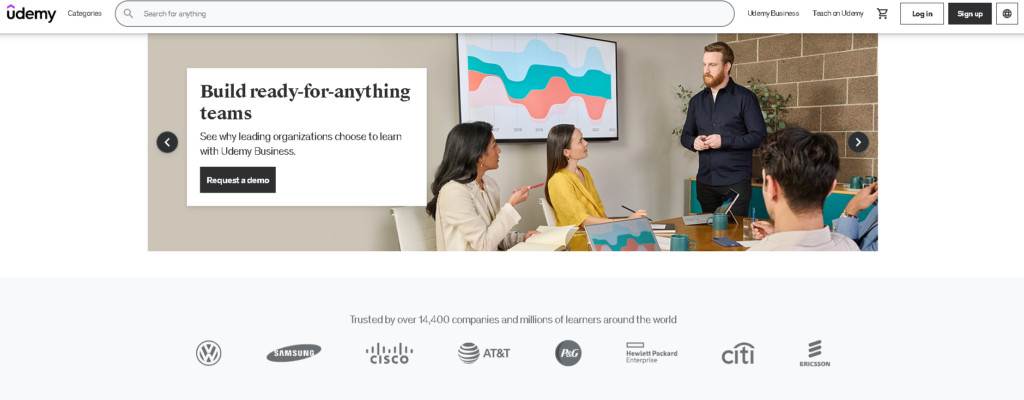
Udemy boasts a vast library of courses covering an extensive array of subjects at affordable prices. With a wide variety of user-generated content, it’s suitable for learners of all interests and budgets, although course quality may vary.
Pros:
- Extensive course library covering a wide range of topics.
- Affordable course pricing, often with lifetime access.
- User-generated content leads to a diverse array of teaching styles.
- Frequent discounts and promotions make courses accessible.
Cons
- Varying course quality and instructor expertise.
- Lack of consistent standards in course content.
- Limited hands-on or project-based learning opportunities.
- Some courses may not be regularly updated, leading to outdated content.
Check out my Best Udemy Courses article to see which courses fit you best!
If you want to explore more online learning platforms, you can check out my Udemy Alternatives article.
Coursera vs edX Certificates and Recognitions
Certificates and recognitions from online courses can play a crucial role in advancing your career and demonstrating your skills to employers or educational institutions.
Both Coursera and edX offer certificates upon course completion, but there are some differences worth noting.
Coursera Certificates
Coursera provides certificates that carry a reputation for quality and credibility. Here’s what you need to know about Coursera certificates:
- Verified Certificates: Coursera offers verified certificates for most of its courses. These certificates include your name, the course name, and the institution’s logo, which can enhance your resume.
- Coursera Plus: If you subscribe to Coursera Plus, you gain access to certificates for many courses at no extra cost, making it an economical choice for those seeking certificates.
- Accredited Degrees: Coursera also collaborates with prestigious universities to offer fully accredited online degrees. These degrees hold the same weight as traditional degrees.
edX Certificates
edX offers certificates as well, and they come with their own set of features:
- Verified Certificates: Similar to Coursera, edX provides verified certificates for most of its courses. These certificates are verified by the institution, which adds credibility to your accomplishments.
- MicroMasters and Professional Certificates: edX offers specialized programs like MicroMasters and professional certificates. These certificates often require a fee but provide focused knowledge and skills in specific areas.
- edX for Business: edX offers professional development courses and certificates tailored to the needs of businesses and organizations.
Coursera vs edX Mobile Accessibility
When comparing Coursera vs edX, the ability to access online courses on mobile devices is a significant factor for many learners.
Both Coursera and edX recognize the importance of mobile accessibility and have developed mobile apps to enhance the learning experience on the go.
Coursera Mobile App
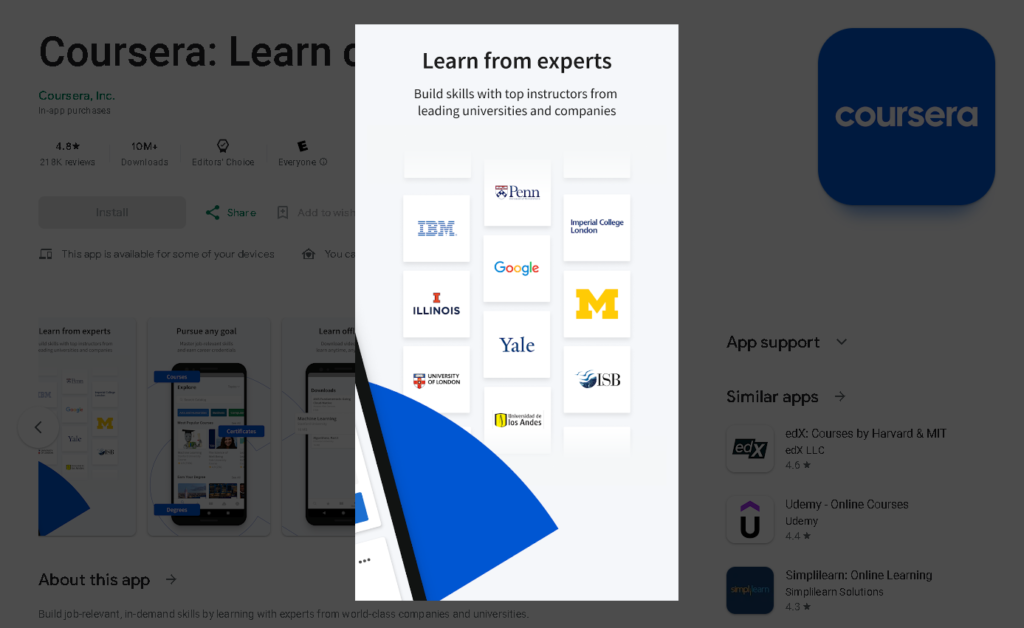
Coursera offers a user-friendly mobile app available for both iOS and Android platforms. Here’s what you can expect from the Coursera mobile app:
- Course Access: With the Coursera app, you can access your enrolled courses, view course materials, and complete assignments from your mobile device.
- Offline Mode: The app allows you to download course content, including video lectures and readings, for offline viewing, which is especially handy when you’re without an internet connection.
- Discussion Forums: You can participate in course discussions and engage with fellow learners directly through the mobile app.
- Notifications: Stay updated with push notifications, ensuring you never miss important course deadlines or announcements.
- Sync Across Devices: Your progress and data sync seamlessly between the mobile app and the web platform, providing a consistent learning experience.
edX Mobile App
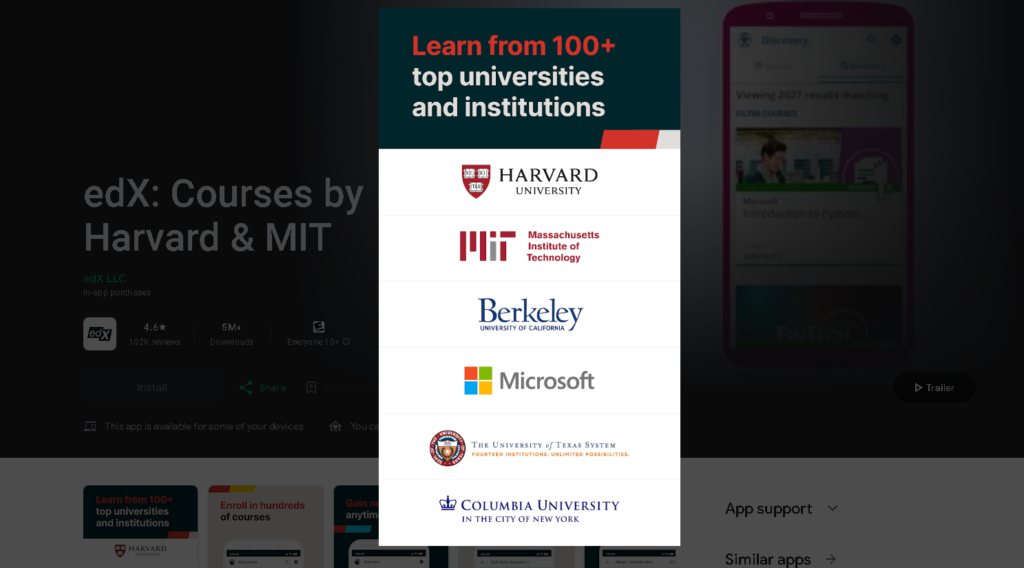
edX also offers a mobile app for iOS and Android users, designed to make learning on the go accessible and convenient:
- Course Access: The edX app allows you to access course materials, video lectures, and assignments from your mobile device.
- Offline Mode: Similar to Coursera, you can download course content for offline viewing, ensuring flexibility in your learning.
- Interactive Features: The app supports interactive elements such as quizzes and discussions, enabling engagement with course material and peers.
- Progress Tracking: Keep track of your course progress, grades, and upcoming deadlines directly from the app.
- Certificate Access: Once you’ve completed a course, you can access and download your certificate through the mobile app.
Coursera vs edX My Personal Experience and Methodology
As someone who has embarked on a journey of continuous learning, I’ve had the opportunity to explore both Coursera and edX extensively.
These platforms have played a really big role in enhancing my knowledge and skills in various domains. Here’s a glimpse into my personal experiences with Coursera and edX:
My Experience with Coursera
Coursera has been my go-to platform for structured and diverse courses, from computer science to psychology, offering top-notch instruction through prestigious university partnerships.
The clear course structure was especially beneficial in complex subjects like machine learning. Coursera’s certifications and accredited degrees added significant value to my academic and professional profile.
As an avid learner, Coursera Plus provided cost-effective access to a wide range of courses and certificates, further enriching my continuous learning journey.
My Experience with edX
My experience with edX offered a unique set of strengths catering to specific learning preferences. I was impressed by edX’s commitment to open-source learning, providing access to course materials without financial constraints.
The platform’s MicroMasters programs and professional certificates were instrumental in helping me gain specialized knowledge and skills, offering a structured pathway to expertise and career advancement.
The flexibility of self-paced courses suited my busy schedule, allowing me to learn at my own pace.
Innovative learning tools like virtual labs enhanced my understanding of complex concepts, and edX’s community engagement through discussion forums added depth to my learning experience.
So, who wins the Coursera vs edX battle? Coursera or edX?
Well, both Coursera and edX have enriched my educational journey in unique ways.
Coursera’s structured approach and diverse course catalog were ideal for deep dives into various subjects, while edX’s open-source philosophy and focus on specialization appealed to my desire for flexibility and career advancement.
My experiences with these platforms underscore the idea that choosing between Coursera vs edX often boils down to aligning the platform’s strengths with individual learning goals and preferences.
What I can say is that for me personally, I prefer Coursera because of all the free courses you can enroll in.
Wrap Up
In conclusion, Coursera and edX, both distinguished platforms in online education, cater to diverse learning preferences.
Coursera excels in structured, academically rigorous courses with a wide subject range and top-tier university partnerships, offering valuable certifications and degrees.
EdX champions open-source learning, emphasizing accessibility, flexibility, and specialization through MicroMasters programs and professional certificates.
As you embark on your online learning journey, your choice between these platforms should align with your individual goals and preferences, ensuring a fulfilling and enriching educational experience tailored to your needs.
Frequently Asked Questions (FAQ)
1. What is the main difference between Coursera and edX?
Coursera offers structured, academically rigorous courses in collaboration with prestigious universities, including fully accredited degrees. EdX focuses on open-source learning, providing accessibility and flexibility through a wide range of courses, MicroMasters programs, and professional certificates.
2. Are Coursera and edX certificates recognized by employers and institutions?
Yes, certificates from Coursera and edX are generally recognized by employers and educational institutions. Their value may vary depending on the course, institution, and industry, but both platforms offer credible certifications.
3. Can I access course materials on Coursera and edX for free?
Yes, both Coursera and edX offer free access to course materials. However, certifications for course completion typically require a fee.
4. What are MicroMasters programs, and how do they work on edX?
MicroMasters programs on edX are specialized, graduate-level programs designed to provide in-depth knowledge in specific fields. They consist of a series of courses, and completing a MicroMasters can often count as credit toward a related master’s degree.
5. Does Coursera offer fully accredited degrees?
Yes, Coursera collaborates with prestigious universities to offer fully accredited online degrees. These degrees are equivalent in value to traditional degrees.
6. What is the Coursera Plus subscription?
Coursera Plus is a subscription service that grants users unlimited access to a vast library of 7,000+ courses and certificates for a single annual fee of $399. It provides cost-effective continuous learning.
7. Are there any financial aid options for Coursera and edX courses?
Yes, both platforms offer financial aid options to learners who qualify. These options can help reduce or waive the course fees.
8. Can I download course materials for offline use on Coursera and edX?
Yes, both Coursera and edX offer the option to download course materials, including video lectures and readings, for offline access.
9. Is there a time limit to complete courses on Coursera and edX?
Course durations vary, but both platforms offer self-paced courses that allow learners to complete them at their own speed. Some courses may have specific deadlines.
10. Do Coursera and edX provide technical support to learners?
Yes, both Coursera and edX offer technical support to learners. You can reach out to their support teams for assistance with course-related issues or technical problems.

